The foremost journal of tropical medicine in the United States has published a supplement honoring the public health legacy of former President Jimmy Carter and the late First Lady Rosalynn Carter. In a demonstration of technical expertise and the respect The Carter Center carries in that field, the supplement features 16 articles authored or co-authored by Carter Center experts. Learn more »
In honor of World Malaria Day, The Carter Center celebrates the Dominican Republic Ministry of Health, which received a 2023 Malaria Champions of the Americas prize from the Pan American Health Organization for its notable progress in eliminating malaria in Los Tres Brazos neighborhood of the capital, Santo Domingo. Learn more »
Maria de los Santos has had enough of malaria. De los Santos, who operates a tiny community bank in San Juan de la Maguana, Dominican Republic, experienced fever, chills, and a less common symptom, severe itching, during a bout with the mosquito-borne illness. She kept the bank open and continued to look after her family despite being sick with a potentially fatal tropical disease. Learn more »
It was many years ago, but Mercedes Sola remembers when her illness came on. She was 30 years old and pregnant with her third daughter. Learn more »
The Carter Center sent a large contingent to the 72nd Annual Meeting of the American Society of Tropical Medicine and Hygiene (ASTMH), held Oct. 18-22 in Chicago. Learn more »
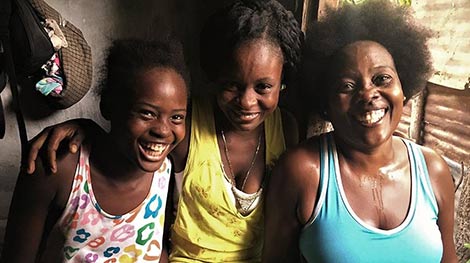 Life is hard enough in Haiti, with its profound poverty, natural disasters, and troubled political history. Add to the mix an insidious tropical disease that causes permanent disfigurement, and the result is misery that defies description.
Learn more »
Life is hard enough in Haiti, with its profound poverty, natural disasters, and troubled political history. Add to the mix an insidious tropical disease that causes permanent disfigurement, and the result is misery that defies description.
Learn more »
By Dr. Kashef Ijaz, Vice President, Health Programs, The Carter Center; Kelly Callahan, M.P.H., Director, Trachoma Control Program, The Carter Center; Dr. Emmanuel Miri, Nigeria Country Representative, The Carter Center; Dr. Zerihun Tadesse, Ethiopia Country Representative, The Carter Center
From the vantage point of a richly resourced and powerful country or society, it’s easy to believe that colonialism is a thing of the past. Unfortunately, that is not the case. The sad fact is that the effects of a colonial mind-set are alive and well in some corners of the global health community. Learn more »
By Paige Alexander, chief executive officer of The Carter Center
This month, I was pleased to sign the Kigali Declaration on Neglected Tropical Diseases, signifying the Carter Center’s 100% commitment to work with dozens of countries, donors, and organizational partners to tackle these terrible diseases Learn more »
By Paige Alexander, Chief Executive Officer, The Carter Center, and Dr. Kashef Ijaz, Vice President-Health Programs, The Carter Center
We at The Carter Center are grieving the unexpected passing of our friend and colleague, Dr. Stephen B. Blount, who had only recently retired after a remarkable career in global public health. Learn more »
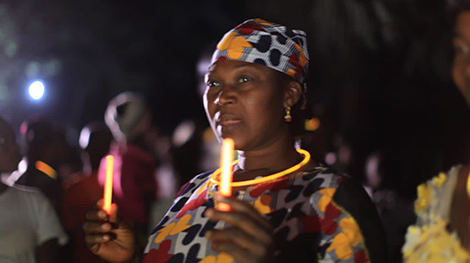 Jan. 30, 2022, marked the third annual World NTD Day, highlighting the global community’s commitment to ending neglected tropical diseases (NTDs) that cause immeasurable suffering among the world’s most marginalized communities. Together The Carter Center and our partners lit up the world as we celebrated hard-earned progress and took action to #EndtheNeglect and #BeatNTDs.
Learn more »
Jan. 30, 2022, marked the third annual World NTD Day, highlighting the global community’s commitment to ending neglected tropical diseases (NTDs) that cause immeasurable suffering among the world’s most marginalized communities. Together The Carter Center and our partners lit up the world as we celebrated hard-earned progress and took action to #EndtheNeglect and #BeatNTDs.
Learn more »
By Paige Alexander, chief executive officer, and Kashef Ijaz, vice president, Health Programs
The 76th Session of the United Nations General Assembly opens Tuesday, Sept. 14. It is a time of great anticipation as representatives of 193 member states come together in the great hall to discuss issues and set an agenda for the coming year. World political leaders, including President Joe Biden, will give speeches that will be closely watched for clues and outright declarations regarding a wide variety of international challenges, global health among them. Learn more »
By Paige Alexander, chief executive officer, and Kashef Ijaz, vice president, health programs
The world’s most vulnerable people work hard every day to overcome poverty and disease. They aren’t interested in handouts, but with a hand up they can get the resources they need to surmount obstacles to prosperity and peace. Learn more »
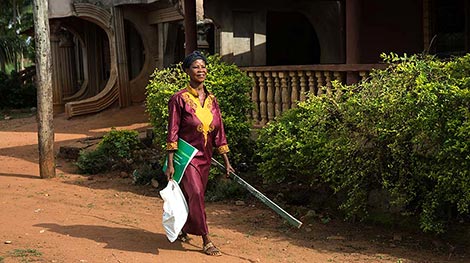 Mass drug administration, in which entire communities receive drug treatment to halt disease transmission, was interrupted or delayed, but intense work went on behind the scenes to develop sets of COVID-safe procedures.
Learn more »
Mass drug administration, in which entire communities receive drug treatment to halt disease transmission, was interrupted or delayed, but intense work went on behind the scenes to develop sets of COVID-safe procedures.
Learn more »
Growing up, Greg Noland voraciously read National Geographic magazines. From his home near Dallas, Texas, Noland became fascinated with other cultures and seeing the world. Learn more »
 Dedicated service is common among community volunteers and health workers with whom The Carter Center partners, but Dorçelan Offre takes it to another level. Offre, 27, will do whatever it takes to help fight malaria in his native rural Haiti, even if it means going far beyond the end of the road.
Learn more »
Dedicated service is common among community volunteers and health workers with whom The Carter Center partners, but Dorçelan Offre takes it to another level. Offre, 27, will do whatever it takes to help fight malaria in his native rural Haiti, even if it means going far beyond the end of the road.
Learn more »
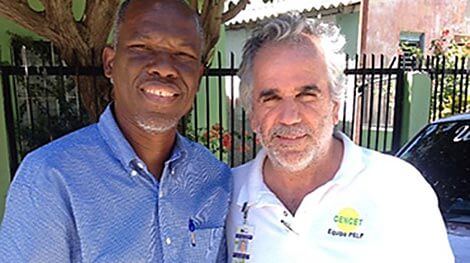 In 2006, the International Task Force for Disease Eradication urged that action be taken to eliminate the mosquito-borne diseases lymphatic filariasis and malaria from Hispaniola. Despite a turbulent history of economic disparity, tensions, and bloodshed, both nations eagerly agreed to binational cooperation, and The Carter Center launched the Hispaniola Initiative to assist them.
Learn more »
In 2006, the International Task Force for Disease Eradication urged that action be taken to eliminate the mosquito-borne diseases lymphatic filariasis and malaria from Hispaniola. Despite a turbulent history of economic disparity, tensions, and bloodshed, both nations eagerly agreed to binational cooperation, and The Carter Center launched the Hispaniola Initiative to assist them.
Learn more »
By Hunter Keys, consultant, Hispaniola Initiative
In the poor neighborhoods where malaria festers in the Dominican Republic, people describe someone who hustles through everyday life as a chiripero, a “lucky sort.” Learn more »
 Life is hard enough in Haiti, with its profound poverty, natural disasters, and troubled political history. Add to the mix an insidious tropical disease that causes permanent disfigurement, and the result is misery that defies description.
Learn more »
Life is hard enough in Haiti, with its profound poverty, natural disasters, and troubled political history. Add to the mix an insidious tropical disease that causes permanent disfigurement, and the result is misery that defies description.
Learn more »
 As a team of health workers arrives in Chan Bon, a tiny mountainside community south of Port-au-Prince, Haiti, the aromas of lush plants and cooking food hang in the air while clouds play hide-and-seek with the Caribbean sun. A small group of children noisily labors to free a makeshift plastic kite whose string is tangled in a tree.
Learn more »
As a team of health workers arrives in Chan Bon, a tiny mountainside community south of Port-au-Prince, Haiti, the aromas of lush plants and cooking food hang in the air while clouds play hide-and-seek with the Caribbean sun. A small group of children noisily labors to free a makeshift plastic kite whose string is tangled in a tree.
Learn more »
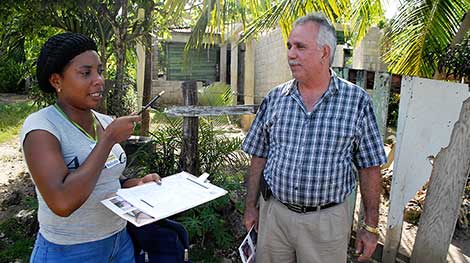 Helping is in Dr. Manuel Gonzales’ nature. It’s not just what he does; it’s who he is. “My vocation is to help people and help my country,” said Gonzales, who became the national manager of the Dominican Republic’s successful Lymphatic Filariasis Elimination Program in April 2001.
Learn more »
Helping is in Dr. Manuel Gonzales’ nature. It’s not just what he does; it’s who he is. “My vocation is to help people and help my country,” said Gonzales, who became the national manager of the Dominican Republic’s successful Lymphatic Filariasis Elimination Program in April 2001.
Learn more »
Malaria, a potentially deadly disease, with its fevers, aches, and extreme fatigue, definitely is not cool. But a music video featuring a great dance beat and a team of top Haitian performers? Now that’s cool! Learn more »
For these boys, freedom from a disfiguring disease means freedom to pursue their dreams on the diamond. Angel Ciriaco and Rigoberto Bryan are best friends who live in San Pedro de Macoris, a province in the southeastern Dominican Republic. The two 16-year-olds like to talk about school, about girls, and most of all about baseball. Learn more »
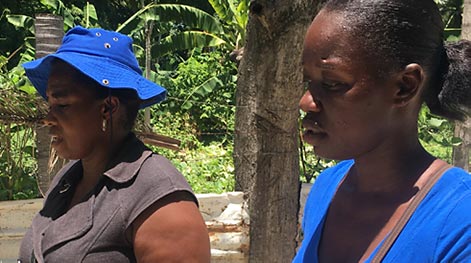 Mirlande Joseph walks the blistering hot, dusty back alleys of Port-au-Prince, greeting people as if she were a politician running for re-election.
“How are you? How is your family? Anyone sick? Did everyone take the medicine when we came by before?”
Learn more »
Mirlande Joseph walks the blistering hot, dusty back alleys of Port-au-Prince, greeting people as if she were a politician running for re-election.
“How are you? How is your family? Anyone sick? Did everyone take the medicine when we came by before?”
Learn more »
By Hunter Keys, consultant, Hispaniola Initiative
Parasites keep strange schedules. Those that cause lymphatic filariasis, for example, are mostly active at night. To detect parasites in the blood, health workers will take a nocturnal sample, sometimes as late as 2 a.m. Learn more »
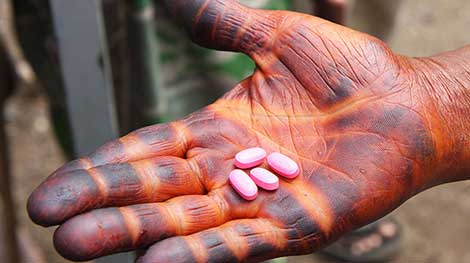 The Carter Center in 2016 surpassed 500 million doses of medication distributed to fight neglected tropical diseases.
Learn more »
The Carter Center in 2016 surpassed 500 million doses of medication distributed to fight neglected tropical diseases.
Learn more »
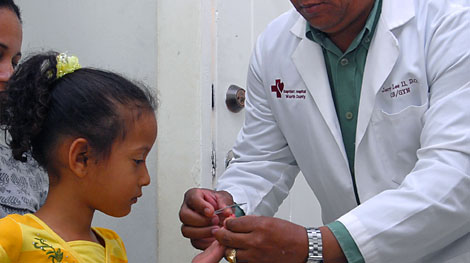 Parasites and bacteria have no respect for international borders. Many international frontiers are marked by rivers and lakes; but the water fleas that host Guinea worm larvae, the mosquitoes that transmit lymphatic filariasis and malaria, and the flies that spread river blindness and trachoma don't care which side they're on.
Learn more »
Parasites and bacteria have no respect for international borders. Many international frontiers are marked by rivers and lakes; but the water fleas that host Guinea worm larvae, the mosquitoes that transmit lymphatic filariasis and malaria, and the flies that spread river blindness and trachoma don't care which side they're on.
Learn more »
By Dr. Gregory Noland, epidemiologist
In honor of Malaria Day in the Americas, we asked Carter Center expert and epidemiologist Dr. Gregory Noland to explain how fighting the disease in Hispaniola differs from strategies employed in Africa. Learn more »
The Carter Center began its work in Haiti and the Dominican Republic after a 2006 recommendation by the Center-sponsored International Task Force for Disease Eradication declared it is “technically feasible, medically desirable, and economically beneficial” to eliminate both malaria and lymphatic filariasis from the shared island of Hispaniola. Learn more »
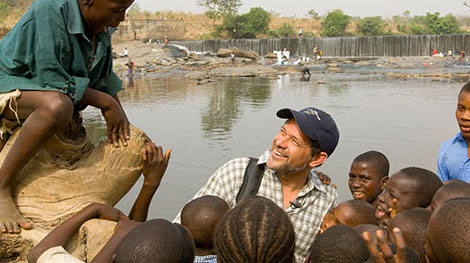 In Guatemala 25 years ago, on a coffee farm situated at the slope of a volcano, Frank O. Richards Jr., M.D., sat under a thinly thatched roof talking with an old man. Chickens foraged on the dirt floor, and a mangy dog slept in the corner.
Learn more »
In Guatemala 25 years ago, on a coffee farm situated at the slope of a volcano, Frank O. Richards Jr., M.D., sat under a thinly thatched roof talking with an old man. Chickens foraged on the dirt floor, and a mangy dog slept in the corner.
Learn more »
The Carter Center is hosting its 2009 health program reviews March 23-31, 2010, with experts from around the world –including representatives from partner organizations including the Bill & Melinda Gates Foundation, Lions Clubs International, the World Health Organization, UNICEF, and the Centers for Disease Control and Prevention – gathered in Atlanta to assess program status and adopt recommendations for the coming year. Learn more »
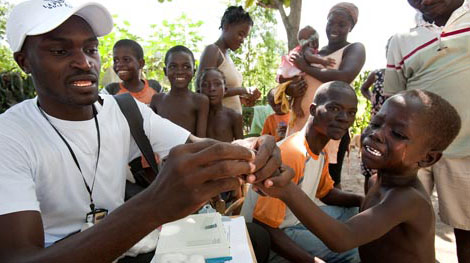 A crowd of children follow Jonel Mompremier, 27, as he travels from house to house in Ouanaminthe, Haiti. They giggle as the health worker asks the same question at every doorstep, "Does anyone at home have any fevers?"
Learn more »
A crowd of children follow Jonel Mompremier, 27, as he travels from house to house in Ouanaminthe, Haiti. They giggle as the health worker asks the same question at every doorstep, "Does anyone at home have any fevers?"
Learn more »
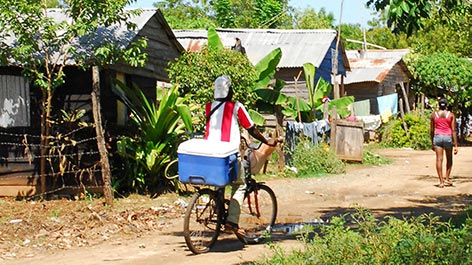 It's a Sunday afternoon in La Bomba barrio, a subdistrict of Dajabón, Dominican Republic, and the entire community can be found outside their clapboard and cement block homes to beat the stifling heat.
Learn more »
It's a Sunday afternoon in La Bomba barrio, a subdistrict of Dajabón, Dominican Republic, and the entire community can be found outside their clapboard and cement block homes to beat the stifling heat.
Learn more »
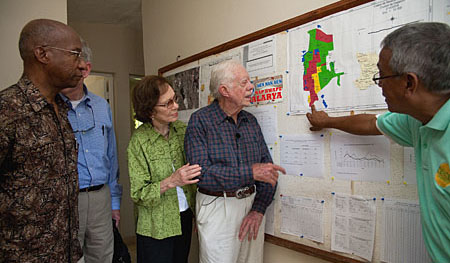 Efforts to eliminate malaria and lymphatic filariasis from the Caribbean island of Hispaniola were underscored Oct. 7-8 during a visit by former U.S. President Jimmy Carter and a Carter Center delegation.
Learn more »
Efforts to eliminate malaria and lymphatic filariasis from the Caribbean island of Hispaniola were underscored Oct. 7-8 during a visit by former U.S. President Jimmy Carter and a Carter Center delegation.
Learn more »
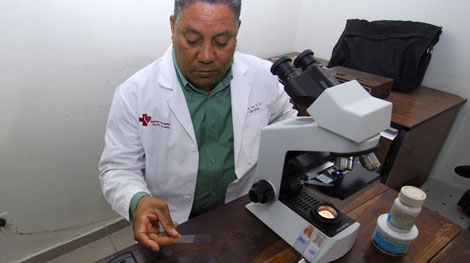 Microscopist Marino Castillo pricks the finger of five-year-old girl Silvana Mayor and draws blood onto a glass slide. The girl's shirt is bright yellow, but her face is weary. Her mother says the girl has had a fever for several days, and the mother is worried that she has malaria.
Learn more »
Microscopist Marino Castillo pricks the finger of five-year-old girl Silvana Mayor and draws blood onto a glass slide. The girl's shirt is bright yellow, but her face is weary. Her mother says the girl has had a fever for several days, and the mother is worried that she has malaria.
Learn more »